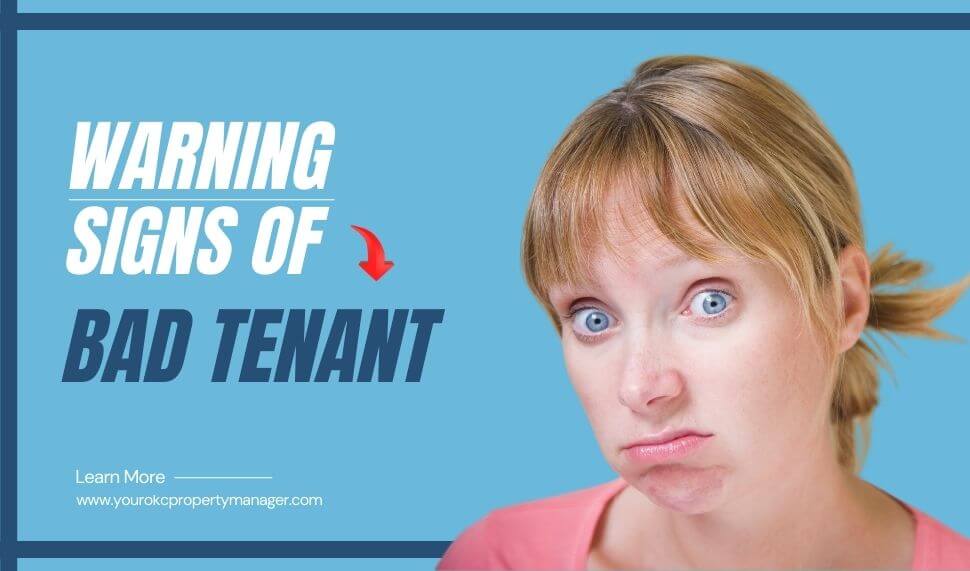One of the most challenging aspects of renting out property is ensuring that your tenants are responsible, reliable, and trustworthy. According to a 2022 survey by the National Association of Residential Property Managers, nearly 25% of landlords experienced tenant-related problems, including late payments, property damage, and even eviction. The impact of a bad tenant goes beyond financial loss. It also damages your reputation, causes emotional stress, and leads to costly legal fees.
Recognizing the warning signs of a bad tenant early in the rental process can save you time, money, and headaches. Thus, looking out for red flags during the screening process, such as inconsistent communication or poor references is crucial. The application process is a key opportunity to screen prospective tenants, as their communication and responsiveness during this phase can reveal much about their reliability. In this article, I am discussing common warning signs of potentially problematic renters with my 20+ years of property management experience combined with data and research to help you identify potential issues before they escalate.
1. Inconsistent or Unreliable Communication
Good tenants understand the importance of clear, consistent communication with their landlords. If a potential tenant is frequently difficult to reach, doesn’t respond to emails or phone calls in a timely manner, or avoids discussing lease terms, it could indicate future problems.
Why It’s a Warning:
Effective communication is vital for resolving maintenance issues, rental payments, and lease renewals. A lack of responsiveness points to poor organization or a lack of respect for responsibilities. According to a study by the National Multifamily Housing Council (NMHC), tenants who are unresponsive to landlord communication are more likely to delay rent payments and cause disputes later in the tenancy.
2. Frequent Late Rent Payments
A pattern of late payments is one of the most obvious signs of trouble. Missed rent payments are a clear indicator of financial unreliability. While occasional late payments can happen due to emergencies or financial setbacks, regular tardiness suggests a lack of financial discipline or priorities.
Why It’s a Warning:
Late payments affect cash flow, and recurring late payments can increase your operational costs and administrative workload. According to the National Association of Residential Property Managers (NARPM), tenants who make late payments regularly are more likely to default on future rent or cause financial strain.
How to Spot It:
Before signing a lease, ask potential tenants for their rental history. Look for any pattern of delays or missed payments. If a tenant has a history of late payments with no valid explanations, consider this a serious red flag.
Recommended Article: Tenant Not Paying Rent? Read what you can do as a landlord.
3. Lack of Rental History or Poor References
When interviewing potential tenants, reliable references are invaluable to avoid rental property issues. A tenant who provides vague or non-existent rental history should raise concerns. It is important to contact past landlords to verify the tenant’s reliability and payment habits. Similarly, if references are unresponsive or provide negative feedback, proceed with caution.
Why It’s a Warning:
A lack of rental history often indicates the tenant is new to renting, which might seem harmless at first, but it could also indicate they haven’t proven their ability to fulfill rental obligations. Negative references, on the other hand, are an obvious red flag. Thus, conducting thorough background checks is crucial in the screening process to ensure a reliable tenant. According to a survey by TenantCloud, 30% of landlords report that poor references from prior landlords were the reason they rejected a potential tenant.
How to Spot It:
Always contact previous landlords and ask about the tenant’s payment history, cleanliness, behavior, and any issues that arose. Genuine references will be willing to speak about the tenant’s past performance.
4. Unrealistically Low Income or Financial Instability
A tenant’s income should be sufficient to cover rent and other living expenses. Varifying the tenant’s income is curicial to ensure they can reliably pay rent. As a general rule, tenants should earn at least 2.5 to 3 times the amount of rent each month. If a tenant’s income is inconsistent or doesn’t align with the rent amount, it could lead to trouble paying rent consistently. Reviewing a tenant’s credit score can highlight any potential red flags regarding their financial history. A bad credit history is a strong indicator of financial instability and should be carefully considered during screening.
Why It’s a Warning:
Financial instability or insufficient income is a significant predictor of future payment issues. Reviewing a tenant’s credit score can highlight any potential red flags regarding their financial history. Research from TransUnion shows that tenants who spend more than 40% of their income on rent are at a higher risk of defaulting on payments.
How to Spot It:
Request proof of income, such as pay stubs, tax returns, or bank statements. It’s essential to verify that the tenant’s financial situation aligns with their ability to meet their financial obligations. As it’s a part of the screening process, which involves a credit check to evaluate the tenant’s financial reliability. If there’s any doubt about their financial stability, consider looking for another applicant.
5. Unusual Tenant Behavior or History of Evictions
If a tenant has been evicted from previous properties, it’s crucial to investigate further. Tenants who have faced eviction may have a history of disruptive behavior, such as late payments, violating lease agreements, or damaging property.
Why It’s a Warning:
A history of evictions is a significant red flag, as it often indicates a pattern of problematic behavior. Such behavior may also encompass excessive noise that disrupts the peace of the community. According to the U.S. Department of Housing and Urban Development (HUD), tenants with multiple evictions on their record are more likely to cause issues in future rental situations.
How to Spot It:
Ask for an eviction history report and carefully review it. If the tenant has been evicted before, inquire about the circumstances. Be sure to conduct a background check that includes eviction records to help assess their reliability.
6. Unkempt Appearance or Poor Personal Hygiene
While this may seem like a subjective concern, how a potential tenant presents themselves can often reflect their behavior as a renter. Tenants who don’t take care of their personal hygiene or appear disorganized may also lack attention to detail in maintaining the rental property.
Why It’s a Warning:
Neglecting personal appearance can correlate with a lack of respect for the property. Tenants who don’t maintain basic cleanliness may not be careful about keeping the property in good condition. According to a report by the National Apartment Association (NAA), tenants who don’t respect the property can lead to higher maintenance costs and more frequent repairs.
How to Spot It:
While it’s not always possible to assess a tenant’s cleanliness by their appearance alone, paying attention to their demeanor, and asking about how they maintain their previous rental homes can offer insights.
7. Disrespecting Lease Terms Before Signing
If a prospective tenant is already trying to negotiate terms or seems unwilling to adhere to the basic requirements of the lease, it could indicate that they will be difficult to manage once the lease is in place. This behavior can include requests for unusual accommodations or the insistence on exceptions to standard policies.
Why It’s a Warning:
A tenant who exhibits poor behavier and does not respect the lease before signing may be prone to breaking rules during their tenancy. Lease violations such as unauthorized pets or subletting are common issues. According to a report by Rentec Direct, 25% of landlords experience issues with tenants breaking lease rules, leading to costly legal action.
How to Spot It:
Be firm about your lease terms and evaluate how potential tenants respond. If they argue over basic policies, such as pet fees or smoking rules, it may signal future problems with compliance.
[Related Post: How to Avoid Bad Tenants in a Rental Property]
Conclusion: Protect Your Property by Staying Vigilant
Preventing tenant issues starts with recognizing early warning signs and conducting thorough screening. A reliable tenant is worth the investment of time and effort. Don’t rush the process. Take the necessary precautions to ensure that you select the right tenant who will respect your property and pay their rent on time. Your investment is valuable, and with the right strategies, you can protect it for years. If you do end up with a problem renter despite your efforts, don’t panic.
Learn the best ways to deal with bad tenants so you can protect your property, stay compliant with Oklahoma law, and regain peace of mind.
If you’re overwhelmed by tenant screening or property management, we’re here to help. Our residential tenant screening services ensure you find reliable tenants, so you can focus on maximizing your rental income. Contact us today to learn how we can make your landlord experience easier and more profitable.
FAQs on Signs of a Bad Tenant
What is the blacklist of bad tenants?
A blacklist of bad tenants is a list created by landlords or property management companies that identifies individuals with problematic rental histories. This may include tenants who have faced evictions, consistently paid rent late, caused property damage, engaged in illegal activities, or created disturbances. While these lists help landlords avoid potential issues, they can raise concerns about fairness and discrimination, making it essential for landlords to adhere to fair housing laws during the tenant screening process.
What does a bad renter really cost?
A bad renter can incur significant costs for landlords, including lost rent from unpaid dues and eviction expenses such as legal fees and court costs. Property damage beyond normal wear and tear can lead to costly repairs, while increased management needs result in higher operational expenses. Additionally, turnover costs for cleaning and preparing the unit for new tenants further diminish profitability. Overall, a bad renter disrupts cash flow and escalates operational challenges, impacting the financial health of rental properties.

Author
Scott Nachatilo is an investor, property manager and owner of OKC Home Realty Services – one of the best property management companies in Oklahoma City. His mission is to help landlords and real estate investors to manage their property in Oklahoma.
 (
(









